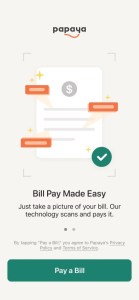Paying bills is hardly a fun thing. So I think it’s safe to say that any technology that can make the process easier is welcome by all.
Papaya is a Los Angeles-based startup with a mission to do just that. It has developed technology to give people a way to pay bills outside of traditional methods, such as through the mail, over the phone or via a Web portal. The company’s mobile application lets users take a photo of any bill and then its artificial intelligence-powered “bill-understanding technology” makes sure it gets paid (after a user has provided payment details, of course).
To prove the point, CEO and co-founder Patrick Kann demonstrated for me via Zoom how even after tearing up a bill into a few pieces, Papaya’s app was able to scan the pertinent parts of the invoice to make sure it was paid.
“As long as a biller has an electronic payment method, anyone can submit payments through our app,” Kann said. “It’s a true universal payment method.”
Kann was inspired to start Papaya after growing up in Brazil, where a similar payment technology already exists.
“People back home were surprised to find out we didn’t have the same capabilities here,” Kann said. “In this respect, the U.S. has been an anomaly, with only 3% of bills being paid by a mobile device. We saw a huge business opportunity with mobile bill payments.”
Kann teamed up with computer vision scientist Jason Meltzer, who led development for the computer vision technology behind the Roomba at iRobot, to build Papaya.
The goal of the company is simple: minimize Americans’ bill pay stress by making it easy to pay any bill with their mobile device. It also claims to help businesses of all sizes in all industries as well as governments and municipalities get paid faster and more often.
Today, Papaya is announcing it has raised $50 million in a Series B round of funding led by Bessemer Venture Partners, with participation from Sequoia Capital, Acrew Capital, 01 Advisors, Mucker Capital, Fika Ventures, F-Prime and Sound Ventures. The financing brings the previously under-the-radar company’s total raised to $65 million since its 2016 inception.
Papaya currently facilitates payments for “hundreds of thousands” of businesses and organizations and millions of users in the U.S. Beyond the mobile app, the company integrates with partners’ billing processes through embedded widget technologies and paper statements.
It’s hoping to build on its existing technology with an extensive product roadmap.

Papaya has already come a long way. In its early days, Kann promoted the app by putting stickers with Papaya’s QR code on people’s windshields after they got a parking ticket in Las Vegas. Over time, the city added it to their paper notices. Then, the company began working with doctor’s offices to offer the option to their patients.
Kann prides himself on an 80-person staff that is made up 60% of underrepresented minorities, and a product engineering team that is 45% female.
So far, its growth has been “completely organic,” with no marketing team, according to the CEO.
“Our cost of customer acquisition is very low relative to a lot of fintechs,” he said.
But of course, part of its capital will go toward building awareness and growing its headcount.
While Kann declined to reveal revenue specifics, he did say Papaya “is on track to acquiring 1 million new active users per year.”
Speaking of revenue, the company’s model is interesting. The app is free for users, and Papaya doesn’t ask for anything “extra” from merchants. Rather, it earns a percentage of revenue from interchange fees that merchants have to pay when they process credit cards.
Bessemer Venture Partners’ Charles Birnbaum says his firm has been following the Papaya team since it first used its “magical” bill pay app for themselves.
“It’s incredibly rare to come across a business that is not only positively impacting millions of consumers by making something painful more seamless but also solving a critical pain point for businesses within several different verticals spanning from healthcare to utilities,” he said. “We have no doubt that the Papaya bill pay experience will become table stakes throughout the consumer financial services landscape in the years to come.”































Comment